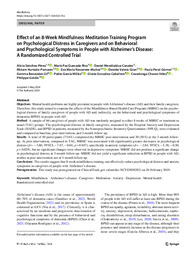Please use this identifier to cite or link to this item:
https://hdl.handle.net/11000/34899Full metadata record
| DC Field | Value | Language |
|---|---|---|
| dc.contributor.author | Sánchez‑Pérez, Alicia | - |
| dc.contributor.author | Quesada‑Rico, María Paz | - |
| dc.contributor.author | Mendialdua‑Canales, Daniel | - |
| dc.contributor.author | Hurtado-Pomares, Miriam | - |
| dc.contributor.author | Navarrete-Muñoz, Eva María | - |
| dc.contributor.author | Valera‑Gran, Desirée | - |
| dc.contributor.author | Peral-Gómez, Paula | - |
| dc.contributor.author | Benavides Gil, Gemma | - |
| dc.contributor.author | García Millán, Pablo | - |
| dc.contributor.author | González‑Caballero, Gloria | - |
| dc.contributor.author | Chaves‑Vélez, Covadonga | - |
| dc.contributor.author | Goldin, Philippe | - |
| dc.contributor.other | Departamentos de la UMH::Patología y Cirugía | es_ES |
| dc.date.accessioned | 2025-01-18T09:23:45Z | - |
| dc.date.available | 2025-01-18T09:23:45Z | - |
| dc.date.created | 2024-05-24 | - |
| dc.identifier.citation | Mindfulness, 15(6), 1289-1304 - May 2024 | es_ES |
| dc.identifier.issn | 1868-8535 | - |
| dc.identifier.uri | https://hdl.handle.net/11000/34899 | - |
| dc.description.abstract | Objectives Mental health problems are highly prevalent in people with Alzheimer’s disease (AD) and their family caregivers. Therefore, this study aimed to examine the effects of the Mindfulness-Based Health Care Program (MBHC) on the psychological distress of family caregivers of people with AD and, indirectly, on the behavioral and psychological symptoms of dementia (BPSD) in people with AD. Method A sample of 66 caregivers of people with AD was randomly assigned to either 8 weeks of MBHC or treatment as usual (TAU) groups. The psychological distress in family caregivers, measured by the Hospital Anxiety and Depression Scale (HADS), and BPSD in patients, measured by the Neuropsychiatric Inventory Questionnaire (NPI-Q), were evaluated and compared at baseline, post-intervention, and 3-month follow-up. Results A total of 50 participants (75.6%) completed the MBHC post-intervention and 30 (50%) at the 3-month followup. At post-intervention, compared to TAU, MBHC was associated with significantly greater decreases in psychological distress (β = − 3.86; 95%CI, − 7.67, − 0.04; p = 0.047), specifically in anxiety symptoms (β = − 2.84; 95%CI, − 5.38, − 0.30; p = 0.029), but no significant changes were observed in depressive symptoms. MBHC did not produce a significant change in psychological distress at 3-month follow-up. MBHC did not yield a significant reduction in BPSD in people with AD, neither at post-intervention nor at 3-month follow-up. Conclusions The results suggest that 8-week mindfulness training can effectively reduce psychological distress and anxiety symptoms in caregivers of people with Alzheimer’s disease. | es_ES |
| dc.format | application/pdf | es_ES |
| dc.format.extent | 16 | es_ES |
| dc.language.iso | eng | es_ES |
| dc.publisher | Springer | es_ES |
| dc.rights | info:eu-repo/semantics/openAccess | es_ES |
| dc.rights | Attribution-NonCommercial-NoDerivatives 4.0 Internacional | * |
| dc.rights.uri | http://creativecommons.org/licenses/by-nc-nd/4.0/ | * |
| dc.subject | mindfulness | es_ES |
| dc.subject | alzheimer’s disease | es_ES |
| dc.subject | caregivers | es_ES |
| dc.subject | meditation | es_ES |
| dc.subject | anxiety | es_ES |
| dc.subject | depression | es_ES |
| dc.subject | mental health | es_ES |
| dc.title | Effect of an 8‑Week Mindfulness Meditation Training Program on Psychological Distress in Caregivers and on Behavioral and Psychological Symptoms in People with Alzheimer’s Disease: A Randomized Controlled Trial | es_ES |
| dc.type | info:eu-repo/semantics/article | es_ES |
| dc.relation.publisherversion | 10.1007/s12671-024-02374-x | es_ES |

View/Open:
Effect of an 8‑Week Mindfulness Meditation Training Program on Psychological Distress in Caregiver.pdf
853,3 kB
Adobe PDF
Share:
.png)
